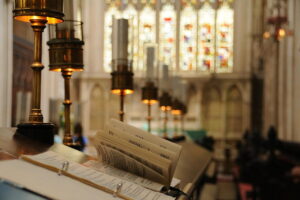Ezekiel 2: 3-5 (RM in Canada), 2-5 (RM in the U.S.) or 1-5 (RCL); Psalm 123; 2 Corinthians 12: 7-10 (RM) or 2-10 (RCL); Mark 6: 1-6 (RM) or Mark 6: 1-13 (RCL).
You can’t go home again.
Home will be different. More to the point, you will be different.
Jesus found that out, and he was simply astonished. He didn’t see it coming.
The writer of the Gospel of Mark sets this up by way of a striking contrast with Jesus’ public ministry to date: teachings, healings, stilling of the storm on the lake. Then there’s last week’s story-within-a-story of the miraculous healing of the woman whose hemorrhage had lasted twelve years and the raising to life of a young girl – yes, not just healing but bringing her back to life. When, at the start of chapter 6 in today’s Gospel, Jesus returns to his hometown, one would expect his fame to precede him. Throngs of jubilant townspeople carrying their sick family members should stream out to meet him on the road. That didn’t happen.
They weren’t outraged because they thought he was teaching gibberish or falsehoods. They responded, first with amazement at his wisdom, then in a second movement, with consternation that someone from their own town should show himself so insightful, so gifted, and so powerful. Whatever glimmer of admiration may have flickered in the beginning, suddenly turned to virulent verbal abuse.
In Mark we read that they lashed out with “Is this not the carpenter, the son of Mary…?” They hurled a venal insult at him by not referring to his father, in fact calling him illegitimate. You can tell how vicious this was by the fact that the later Gospels of Matthew and Luke rewrote this line to soften the insult: Matthew changes it to “the carpenter’s son” and Luke to “son of Joseph.”
All four Gospels have Jesus remarking that no prophet is without honour except in their own land and among their own people. Notice how Jesus shifts the attack here by calling himself a prophet. He claims for himself the call of an agent of God, whether he and his message are accepted or not, a risk of rejection echoed in the call of Ezekiel in our First Reading. This would not be his first rejection – the Gospel accounts are studded with disputes with Pharisees, Sadducees, his own family, his closest friends, and finally betrayal to the authorities and execution.
This uncomfortable incident tells us something about Jesus’ teaching and healing power. The people who had known him in childhood were “scandalized” at him – the word refers to a stumbling block, or even setting a trap for someone. As a result, his power to heal was severely limited. Now, a glib preacher might stick together this week’s and last week’s Gospels to say, See, the officer Jairus and the woman with the hemorrhage believed in him and the healing worked, but where no one had faith, he couldn’t do it. That might urge the hearers to have more faith, but what does it say about God? That God’s power is truncated when people don’t believe? Is it like magic again? As if the magic doesn’t work unless you really, really believe? Like a child? Like the Cowardly Lion in the Wizard of Oz?
Both faith and common sense tell us that human beings do not control God. Anyone who has prayed diligently and desperately for a favour, or a turn of events, or yes, a healing that did not happen, knows that. God is not a vending machine for which you need the right coins or tokens, or a pad to tap your credit card. With God we are always in dialogue with a living person, a being of unfathomable infinity and immeasurable love.
The later Gospels rarely show Jesus so deeply affected by the people gathered around him. As we often are, he was caught off-guard, stunned, unable to offer wisdom and healing to those who ruthlessly belittled him. As we often are, he was ridiculed by those who thought they knew him best. He had to move on. Sometimes, so do we.
Jesus was incarnate in our flesh, lived on our earth, dealt with other humans, and too often suffered disappointment and persecution. We may be misunderstood and abused as well, in spite of our good intentions. And yet, we are never alone.
© Susan K. Roll
This Reflection is adapted from that of July 4, 2021.
Susan Roll retired from the Faculty of Theology at Saint Paul University, Ottawa, in 2018, where she served as Director of the Sophia Research Centre. Her research and publications are centred in the fields of liturgy, sacraments, and feminist theology. She holds a Ph.D. from the Catholic University of Leuven (Louvain), Belgium, and has been involved with international academic societies in liturgy and theology, as well as university chaplaincy, Indigenous ministry and church reform projects.




